| Contribute a translation | Source (English) |
|---|---|
Meditation on Death.[1] June 1835. | |
Am I afraid to die? Doth my soul shrink within itself as I gaze on a passing funeral? Is there a creeping of the flesh, a sickening of the heart as I think on death? The smile passes from my lips, the heedless tone of gaiety fades, as I look on a funeral train, but not in dread; in awe, in sacred awe, but my soul feels as I think on death, a longing after Heaven! | |
There is nought yet in this world to dim the bright picture of Heaven:— as long as it pleases my Heavenly Father to guard me in this world I am content to live; but when it is His pleasure to remove me hence, I have no dread of death; I know not what it is to feel that fondness for a passing world to live in dread of death, and “die a thousand deaths in fearing one.”[2] From The Complaint or, Night-Thoughts (1742) by Edward Young (1671-1765) in “Night the Fourth. The Christian Trumph: Containing Our Only Cure for the Fear of Death, and Proper Sentiments of Heart on That Inestimable Blessing” from Young to the Honourable Mr. Yorke. | |
We lament over the departed, but we lament our loss; surely not that they have quitted a world where joy and sorrow mingle, to enter one of eternal bliss! We mourn, for perchance a family circle is deprived of one of its loved supporters; we feel their absence, we miss their affection, their council, we weep for we can see them not again, at least not in this life, and there is a blank where they have been. | |
Perchance a friend long loved and dear has gone to her last home, and we weep over her tomb, for there is a void within our hearts which no one else can fill — the joys of this world once enjoyed with her are joys no longer. | |
Perchance a fond mother weeps over her child, cut off in the spring of life: she looks in vain for the endearing smile, she can no longer watch the dawning mind, the rise to fame; and a parent’s grief no human skill can cure. But, can we weep for the fate of the departed— weep, that they are removed from a chequered world where perfect happiness is not. | |
When we see those in the early bloom of youth cut off, we may sympathise with their mourning friends and weep for them, that those so dear to us are gone; but not for the released one, whom God has taken to Himself, ere the troubles of this world are his, whilst yet the pleasure of an earthly world have been his lot, alone, and ere sin has dimmed his days; in innocence he is snatched away to realms of eternal bliss! | |
Death has no terrors for me. save when I think of his approach to those who are so dear to me, and without whom, my life would be a cheerless blank. Is it because there is a weight upon my soul, a ceaseless longing, is it in my present state of mind that thus are my thoughts on death, is it only now I believe I fear it not? | |
In moments of happiness and joy, when my lot was light and cloudless, and my spirits, wild and joyous, I taught my soul to think on death, and even then there was no terror, but should I think thus when stretched upon the bed of death? I picture myself then, and there is a greater trembling on my soul, but still it is not abject terror. | |
And what is death? The separation of the soul from the body, the conclusion of the present life, the entrance into a new and unknown state. The first to me is not agonising. We look on disease as the forerunner of death; but the help of God may heal the anguish of the body, by bestowing strength of mind; and it is ours to pray to Him for that state of mind which will best prepare us for the fast approach of death, and if in our hours of happiness and health we appeal to Him, to soften the terrors of disease and death, in the hour of need, He will not forsake us, ‘‘Yea though I walk through the valley of the shadow of death, I will fear no evil, for Thou art with me.” (Psalms 23:4) O is there not blessed comfort there? | |
The close of this life brings no terrors to my soul. To earthly joys as yet I am not wedded: to part with those I love, would be the only pang, to rend that tie alone would bring bitterness; but my soul would think on that blest hour, when we should meet to part no more, in realms of eternal happiness, where the troubles of the earthly world are not, and all is blessedness! | |
At the end of every worldly pleasure, we may ask, What are the pleasures of this world, compared to those of Heaven? As naught; here there is no lasting happiness, there, naught, save eternal bliss. | |
But how can I look on death as an entrance into a new world, an unknown region, when my soul will wander forth alone with its many sins clinging round it as accusers before the throne of the Most High, what supports me beneath that terrific thought? my humble faith in the infinite mercy of an infinitely merciful God, who has promised to “shew mercy unto thousands of them that love Me and keep My commandments,” (Deuteronomy 5:10) who for the sake of His Holy Name will shew mercy unto His people Israel, and judge them not according to their transgressions, but according to the dictates of His infinite mercy; He will temper justice with mercy; He will listen not to the dictates of his just anger; He will pardon the infirmities and sins of those that love Him and seek Him, and keep His commandments, and do their duty to Him, in that station where He hath placed them. | |
Oh there is no terror when we thus think on death; when we quit this mortal prison and the released soul springs from its weighty thraldom, and wings its flight on the pinions of faith and love to the throne of the Most High! | |
Oh I will pray to Him to guide me in this life that my death may be thus blessed; that the bed of death may lose its terrors, that when I feel his quick approach, my thoughts of death may be as now.[3] Truly was this prayer heard and answered. [—Sarah Aguilar] — It is well to think on the king of terrors when we see him not, when at a distance merely in fancy we behold him; but when stretched on the bed of sickness, when our dim eyes can scarce discern the features of those we have loved so long, when our failing senses can but faintly feel the last kiss affection may press upon our lips, where the damp drops of death are settling. | |
I will not shrink from this picture; awful as it is, I will not refuse to think of it, now I am in health and youth, that when it cometh it may not find me unprepared. I will pray to my Heavenly Father to subdue the natural tremblings of my soul, and teach me how to walk in His way and keep His commandments, that death may never find me unprepared. | |
I am not good enough to die; my trials in this world are scarce begun, those, that are to chasten me for Heaven; blessings have been my earthly portion, and in this world of checkered joy and woe I scarce have mingled, ’tis no credit if I guard myself from sin, when no temptation is before me. | |
I am not good enough to share the joys of Heaven. O, there is a longing in my ardent soul for what, I know not. I do not wish to die till my heavenly Father thinks fit to call me hence; but, when my soul paints the glory of Heaven, the refulgence of the Almighty’s Throne, it feels as ’twould burst its earthly thraldom and worship with angels round His dazzling Throne— but I lose myself in Him. | |
I will think of death, and it shall not be in terror, for every night I will appeal to Him in whose power it is, to rob death of its sting. | |
I will pray that death shall not find me unprepared, and my prayers shall bid me think, another day of my earthly career is run, and I am nearer that awful hour when “the silver cord is loosed, the golden bowl broken, the pitcher broken at the fountain, the wheel broken at the cistern, when the dust shall return to the earth as it was, and the spirit shall return unto God who gave it.” (Ecclesiastes 12:6-7) | |
And I will think of the deep gloom of the narrow grave, I will think of the worm in the sod, like whom I shall be, and no darkness, no gloom will be in my thoughts, for there “The wicked cease from troubling, and the weary are at rest.” (Job 3:17) | |
Blessed be the Name of the Lord! |
“Meditation on Death” by Grace Aguilar was published posthumously by her mother Sarah Aguilar in the UK edition of Sacred Communings, pp. 82-87. It is not found in the US edition. A note on the title indicates clarifies that Grace wrote this in June 1835. Another note in the text (from Sarah) shares that Grace’s posture towards death in this prayer also appeared to describe her experience of passing twelve years later in 1847.
Source(s)

Notes
| 1 | June 1835. |
|---|---|
| 2 | From The Complaint or, Night-Thoughts (1742) by Edward Young (1671-1765) in “Night the Fourth. The Christian Trumph: Containing Our Only Cure for the Fear of Death, and Proper Sentiments of Heart on That Inestimable Blessing” from Young to the Honourable Mr. Yorke. |
| 3 | Truly was this prayer heard and answered. [—Sarah Aguilar] |

“Meditation on Death, by Grace Aguilar (1835)” is shared through the Open Siddur Project with a Creative Commons Public Domain Dedication 1.0 Universal license.
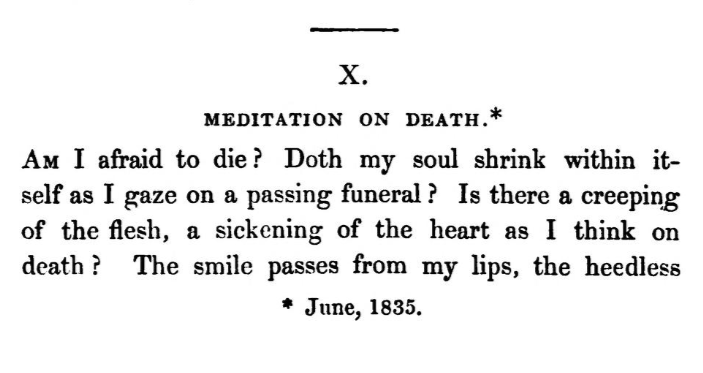

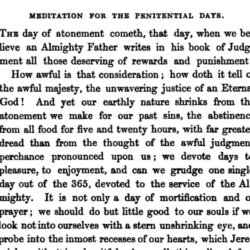
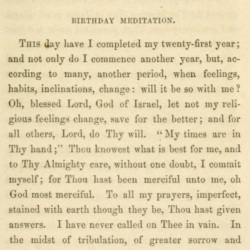
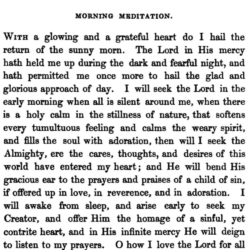
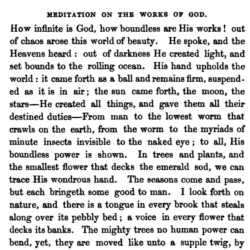




Leave a Reply